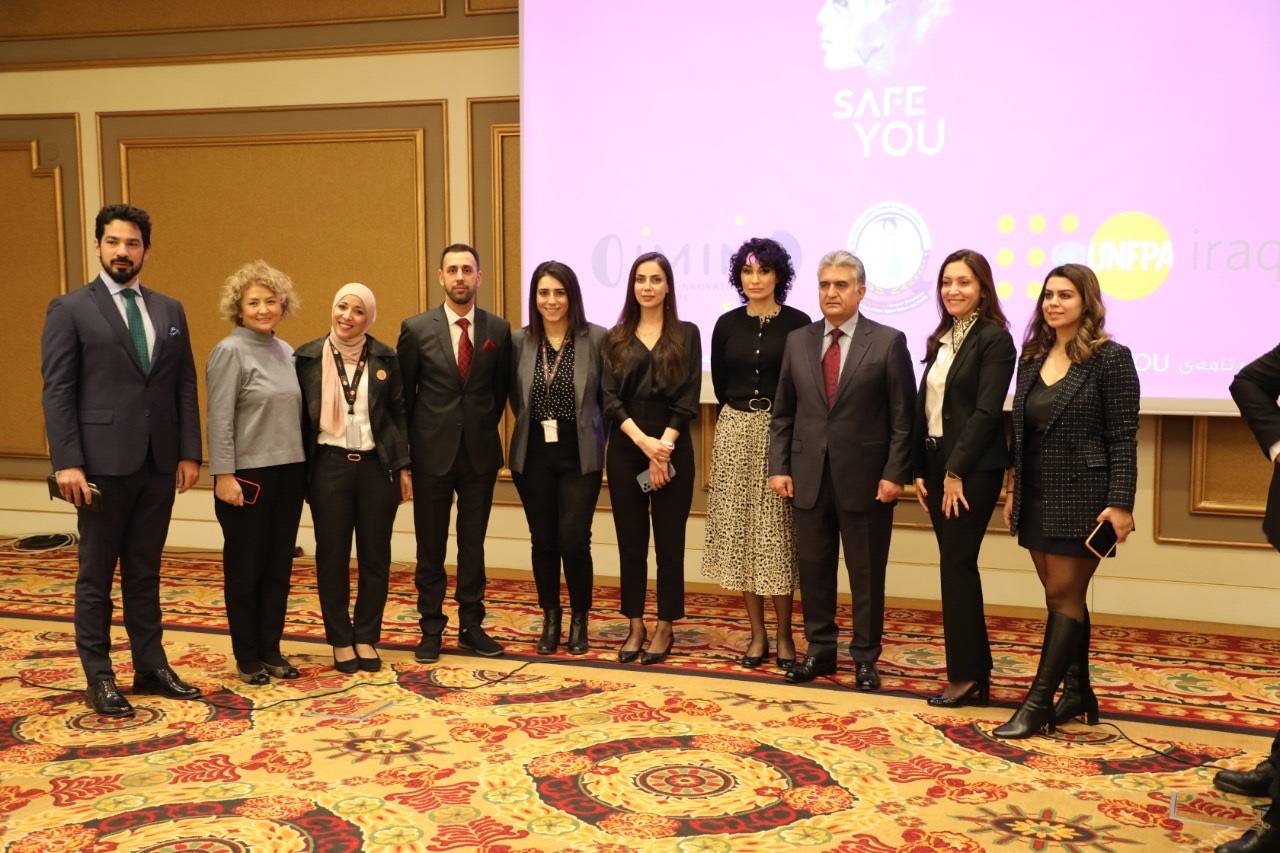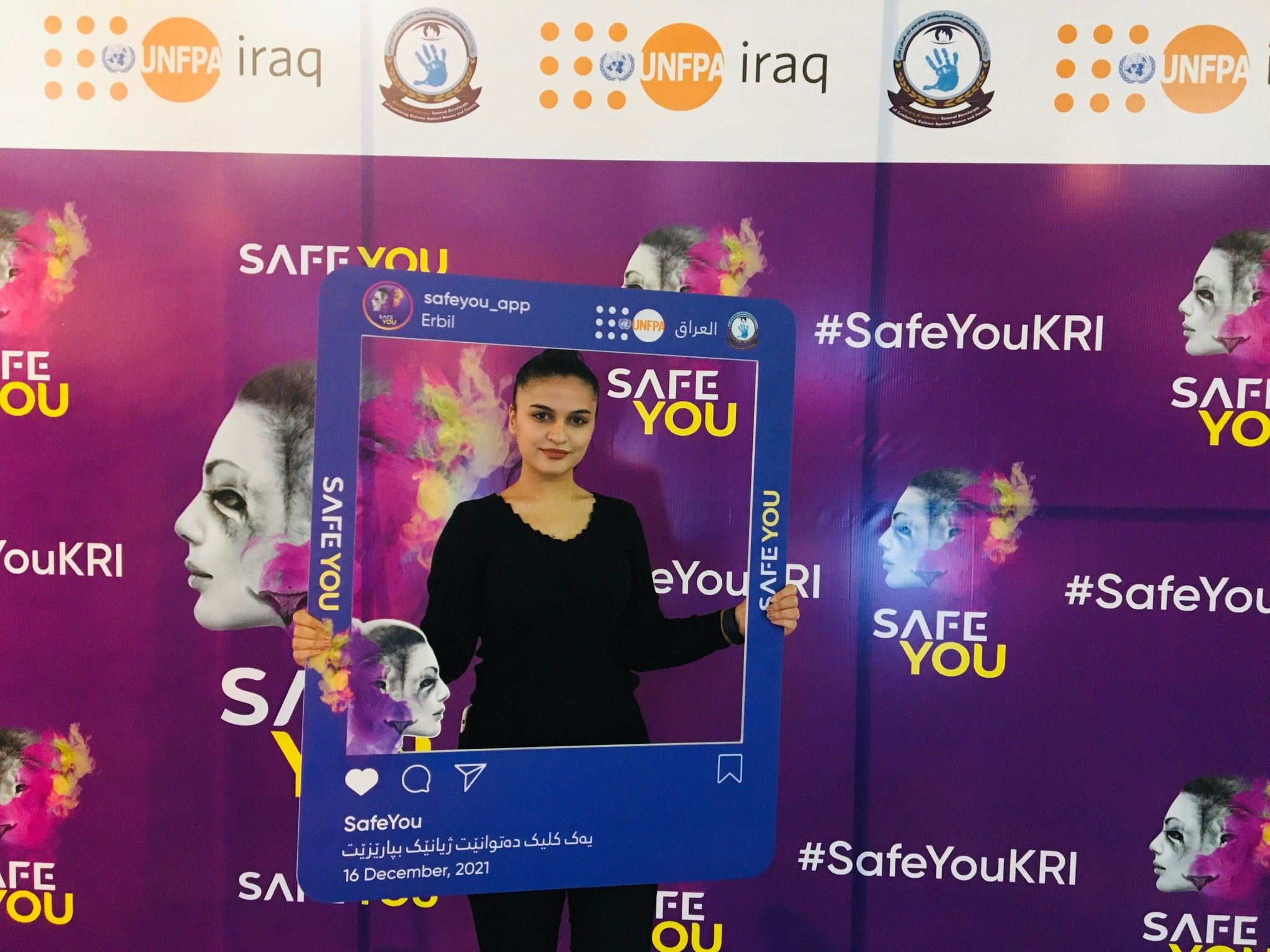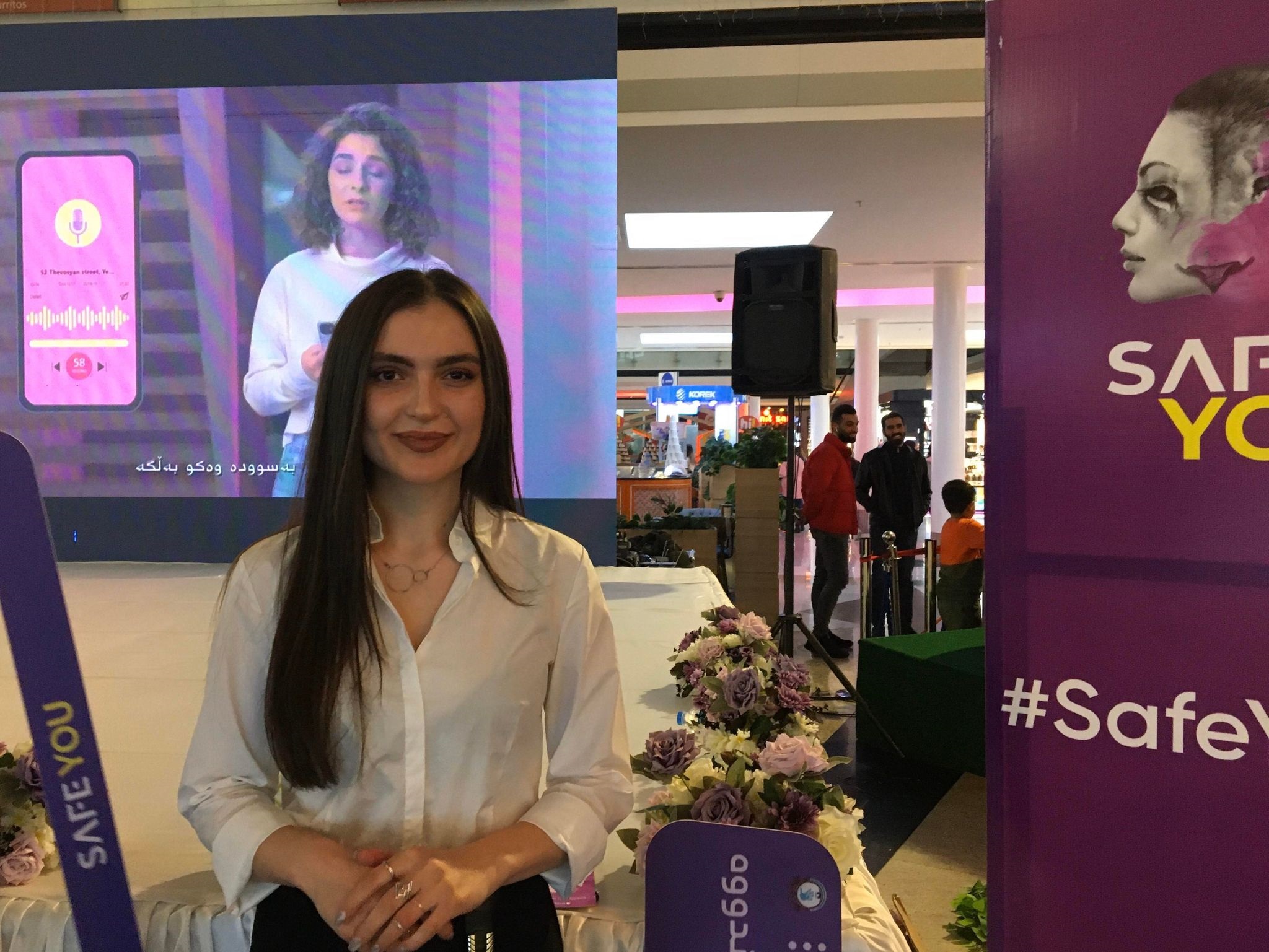
A family pose during the promotional launch of the SafeYOU app in Erbil's Family Mall (L) and members of the Directorate of Combating Violence against Women (R) attend the official launch in Erbil's Divan Hotel on December 16, 2021. Photos: Submitted
ERBIL, Kurdistan Region - A free mobile application aiming to tackle gender violence and improve the safety of women and girls in the Kurdistan Region launched on Thursday, with an official event attended by senior officials followed by campaigns across the Region encouraging the widespread registration of the new tool among people of all ages.
The SafeYOU app, funded by the United Nations Population Fund (UNFPA) in collaboration with the Kurdistan Regional Government (KRG), was launched in the Kurdistan Region following its successful roll-out by the UNFPA in Georgia and Armenia, an estimated year-ahead of its introduction in Iraq.
At the launch event in Erbil’s Divan Hotel on Thursday morning, officials including the KRG’s Minister of Interior Reber Ahmed, the outgoing Head of the General Directorate of Combatting Violence against Women Kurdo Omer, and the UNFPA Representative to Iraq Rita Columbia collectively stressed the importance of preventing violence against women and girls.
Speaking at the hotel, the KRG’s Minister of Interior expressed the government’s determination to eradicate gender-based violence. “The Kurdistan Regional Government has zero tolerance towards perpetrators of gender-based violence,” he told the audience. “The SafeYou application makes us one step closer to achieving a violence-free society, and we will not stop until we reach this goal.”
Iraq and the Kurdistan Region suffer from high rates of sexual and gender-based violence, which has killed 18 women in the Kurdistan Region in the first ten months of 2021, according to statistics from the Directorate of Combatting Violence against Women. The office recorded 19 cases of sexual assault in October.
Discussing how the app works to help women, girls and their families to feel safe, UNFPA’s Rita Columbia explained how it’s “linked to the 119 helpline managed by the trained officers of the Directorate of Combatting Violence against Women.”
The directorate launched the 119 helpline at the end of 2018, aiming to provide callers with legal and mental support. More than 11,000 people contacted the hotline in 2020, Omer told Rudaw in November.
One of the main features of SafeYou, which is available in Arabic, English, Kurmanji and Sorani, is its help button. When clicked, the emergency feature instantly sends the user’s exact geolocation to a trained security officer as well as three personal contacts (including male contacts, such as a father or brother) whom they trust and have been pre-programmed into the app. The service is free of charge and information received through the app is entirely confidential, Columbia explained.
The app also includes an anonymous forum to connect women and girls with each other, a space for individuals to seek information about in-person services and organisations working to tackle gender-based violence, harassment, and abuse, and an online chat-function with skilled protection forces who can provide knowledge about their legal rights, and what action to take in situations which may not be deemed “emergency” but are nonetheless wrong and illegal following the introduction of the Combating Domestic Violence Law ten years ago.
The KRG passed the law in 2011, criminalizing domestic violence and equipping the directorate to combat violence by investigating it. Femicide and intimate partner violence is an ongoing issue in the Region.
In collaboration with the telecommunications agency Korek, SafeYou also enables a total of seven emergency messages to be sent for free at any one time; up to 3 to close family and friends, 3 to service providers (NGOs and state authorities), as well as the police. In addition, the app automatically records a one minute audio recording of the surroundings when the SOS function is activated, which can be used for later proof of crime which, still, is an all-too frequent occurrence in the Region.
To promote the SafeYOU app, concurrent events were held at Erbil, Dohuk and Sulaimani's Family Malls. With balloons, personalised snacks, banners, photo-frames and a large screen showing the app’s explanatory and promotional video on loop, many women found themselves drawn to the centre of the mall.
“It’s a good app for me as a girl,” 21-year-old Bahra Mohammed, who was quick to download the app on her phone, told Rudaw English. “It can often feel unsafe in places and I sometimes work in the evenings.”
This year, Mohammed was awarded the Miss Erbil title after taking part in the Miss Iraq 2021 competition, facing horrid comments and messages criticising anything from her appearance to the fact she took part in the event.
Although she stood her ground and is grateful to her family for their important support, her experience illustrates the persistent judgement women face on a daily basis. While Bahra has fortunately not experienced direct violence, she downloaded the app to discuss issues with other women on the app's forum function, and to reduce stigma around sharing negative experiences.
Questioned about whether the KRG could be doing more to reduce cases of violence against women, she told Rudaw English that the government was "very helpful for us," but the issue was with the stigma and “culture of secrecy” around personal issues.
"We just need to share our problems and we must tell them without caring what people say or think about a person who has been harassed by someone who looks at women like a savage."
“Lots of blame goes to the woman,” Bahra continued. "We shouldn’t be shy as it’s not our mistakes.”
The forum section of the app seeks to break some of this stigma, providing access to women only, peer-to-peer discussions on relevant topics and concerns, as well as providing a space to put questions to specialists such as lawyers, psychologists, doctors and other counselors.
Ayten Riza, a recent graduate of the American University of Sulaimani, told Rudaw English in Erbil that the app's list of organisations available to offer face-to-face support was especially useful for people from different areas in the Region.
“I don’t always know who to contact,” she said, swiping through the list of specialist support groups. “This app provides so many organisations that can help and I’m sure more will be added over time.”
Like most women, Ayten explained how she had “gone through annoying situations in places like taxis.”
“It can be hard to gauge peoples’ intentions in the Kurdistan Region, which can cause many dangerous situations,” she continued. “I feel safer with this app.”
Hopefully the SafeYOU tool will go some way to tackling immediate threats and contribute to breaking down persistent cultural barriers.
Hotline details: call 119 to seek support or download the SafeYOU app.




.jpg)







Comments
Rudaw moderates all comments submitted on our website. We welcome comments which are relevant to the article and encourage further discussion about the issues that matter to you. We also welcome constructive criticism about Rudaw.
To be approved for publication, however, your comments must meet our community guidelines.
We will not tolerate the following: profanity, threats, personal attacks, vulgarity, abuse (such as sexism, racism, homophobia or xenophobia), or commercial or personal promotion.
Comments that do not meet our guidelines will be rejected. Comments are not edited – they are either approved or rejected.
Post a comment